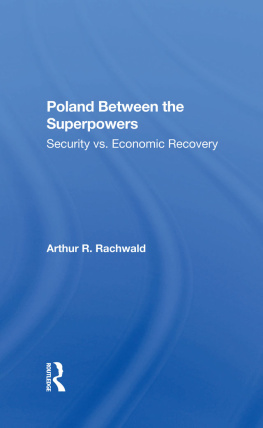First published in 1990 by Crane Russak, a member of the Taylor & Francis Group
This edition first published in 2021
by Routledge
2 Park Square, Milton Park, Abingdon, Oxon OX14 4RN
and by Routledge
52 Vanderbilt Avenue, New York, NY 10017
Routledge is an imprint of the Taylor & Francis Group, an informa business
1990 Taylor & Francis New York Inc.
All rights reserved. No part of this book may be reprinted or reproduced or utilised in any form or by any electronic, mechanical, or other means, now known or hereafter invented, including photocopying and recording, or in any information storage or retrieval system, without permission in writing from the publishers.
Trademark notice: Product or corporate names may be trademarks or registered trademarks, and are used only for identification and explanation without intent to infringe.
British Library Cataloguing in Publication Data
A catalogue record for this book is available from the British Library
ISBN: 978-0-367-68499-0 (Set)
ISBN: 978-1-00-316169-1 (Set) (ebk)
ISBN: 978-0-367-71159-7 (Volume 20) (hbk)
ISBN: 978-0-367-71166-5 (Volume 20) (pbk)
ISBN: 978-1-00-314958-3 (Volume 20) (ebk)
Publishers Note
The publisher has gone to great lengths to ensure the quality of this reprint but points out that some imperfections in the original copies may be apparent.
Disclaimer
The publisher has made every effort to trace copyright holders and would welcome correspondence from those they have been unable to trace.
USA | Publishing Office: | Taylor & Francis New York, Inc.
79 Madison Ave., New York, NY 10016-7892 |
Sales Office: | Taylor & Francis Inc.
1900 Frost Road, Bristol PA 19007-1598 |
UK | Taylor & Francis Ltd.
4 John St., London WC1N 2ET |
Superpowers in Economic Decline
Copyright 1990 Taylor & Francis New York Inc.
All rights reserved. No part of this publication may be reproduced, stored in a retrieval system, or transmitted, in any form or by any means, electronic, electrostatic, magnetic tape, mechanical, photocopying, recording or otherwise, without the prior permission of the copyright owner.
First published 1990
Printed in the United States of America
Library of Congress Cataloging in Publication Data
Cohen, Richard 1946-
Superpowers in economic decline / Richard Cohen and Peter Wilson.
p.cm.
Includes bibliographical references.
ISBN 0-8448-1624-8. ISBN 0-8448-1625-6 (pbk.)
1. United StatesArmed ForcesAppropriations and expenditures.
2. Soviet UnionArmed ForcesAppropriations and expenditures.
3. United StatesEconomic conditions1981- 4. Soviet Union Economic conditions1976- I. Wilson, Peter A., 1928-
II. Title.
UA23.C585 1990
330.94785dc20 90-32080
CIP
Contents
List of Figures
List of Tables
Acknowledgments
Chapter 2. Soviet Economic Decline and Its National Security ImplicationsReasons and Responses
Economic Decline: The Reasons
Economic Decline: And the Response
The Soviet Economic Dimension of Security Vulnerability
Chapter 3. Whither the Soviet Threat?
The Andropov Coalition: A Reaction to Economic Decline and Its Alarming Security Implications
Gorbachevs Mission: Reversing the Long Cycle Decline and Forging a Minimal Line of Security
Why Moscow Must Cut Defense Spending
The Future Soviet Threat
Chapter 4. Economic Constraints on U.S. National Security SpendingReasons and Responses
Why The U.S. Economy has Faltered
U.S. Postwar Policy: Responding to the Inflation/ Output Dilemma While Meeting the Challenge to Payments Balances
The U.S. Economy: Cyclical Structure and Inter-cyclical Retreat, 1959-82
Washington Confronts the Economic Dimension
Chapter 5. Taking Stock of the Reagan Revolution
A Supply-Side Effort to Reverse the Economic Slide
A Revolution in National Security Accounts
Chapter 6. The Defense Investment Dilemma of the 1990s: Contemporary or Transcentury Weapons?
Transcentury Weapons: Components and Costs
The Cost Explosion in Contemporary Forces
Chapter 7. Conclusion: Expanding the Scope of U.S. National Security Policy
The Economic Policy Component: A Cycle of Adjustment
The Defense Investment Component: Pursuing Advantages and Opportunities
Appendices
Appendix AU.S. Government National Security Outlays, FY1940-88
Appendix BU.S. External Balances, 1946-88
Appendix CNational Security and Transfer Payments as a Percent of GNP, FY 1940-88
Appendix DNational Security and Transfer Payments as a Percent of U.S. Government Outlays, FY1940-88
Appendix ENational Defense Investment and Procurement as a Percent of U.S. National Defense Expenditures, FY 1962-88
Notes
Bibliography of Data Sources
Selected Bibliography
About the Authors
Figure 2.1 Long-term Soviet economic performance
(a) Soviet national income growth, 1966-2000official Soviet vs. Aganbegyans estimates and projections, 10
(b) The Soviet long cycle, 10
Figure 2.2 Stalins economic reforms and the accelerated rise in factor input costs, 13
Figure 2.3 Forces contributing to the rising costs of Soviet labor, 1961 80, 19
Figure 2.4 Forces behind Soviet economic growth, 1961-80, 22
Figure 2.5 The Soviet policy response to faltering economic performance, 25
Figure 2.6 Moscows national security cost and its disposition toward the Economic Dimension of Security Vulnerability, 32
Figure 3.1 Lines of growth and Soviet security, 57
Figure 3.2 The rise and fall of Soviet GNP and labor productivity growth rates, 1985-88, 67
Figure 3.3 The rise of the Soviet government budget deficit under Gorbachev, 70
Figure 3.4 Figure 3.4 U.S. and USSR estimates of Soviet defense spending and their impact on the portion of defense spending Moscow is prepared to cut, 85
Figure 3.5 Alternative Soviet threat futuresshort and long term,














